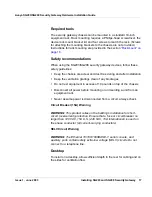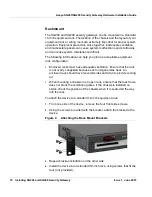
TCP/IP Facilities
Customers may experience differences in product
performance, reliability and security depending upon network
configurations/design and topologies, even when the product
performs as warranted.
Standards Compliance
Avaya Inc. is not responsible for any radio or television
interference caused by unauthorized modifications of this
equipment or the substitution or attachment of connecting
cables and equipment other than those specified by Avaya
Inc. The correction of interference caused by such
unauthorized modifications, substitution or attachment will be
the responsibility of the user. Pursuant to Part 15 of the
Federal Communications Commission (FCC) Rules, the user
is cautioned that changes or modifications not expressly
approved by Avaya Inc. could void the user’s authority to
operate this equipment.
Product Safety Standards
This product complies with and conforms to the following
international Product Safety standards as applicable:
• Safety of Information Technology Equipment, IEC 60950,
3rd Edition including all relevant national deviations as
listed in Compliance with IEC for Electrical Equipment
(IECEE) CB-96A.
• Safety of Information Technology Equipment, CAN/CSA-
C22.2 No. 60950-00 / UL 60950, 3rd Edition
• Safety Requirements for Customer Equipment, ACA
Technical Standard (TS) 001 - 1997
• One or more of the following Mexican national standards,
as applicable: NOM 001 SCFI 1993, NOM SCFI 016
1993, NOM 019 SCFI 1998
Electromagnetic Compatibility (EMC) Standards
This product complies with and conforms to the following
international EMC standards and all relevant national
deviations:
Limits and Methods of Measurement of Radio Interference of
Information Technology Equipment, CISPR 22:1997 and
EN55022:1998.
Information Technology Equipment – Immunity
Characteristics – Limits and Methods of Measurement,
CISPR 24:1997 and EN55024:1998, including:
• Electrostatic Discharge (ESD) IEC 61000-4-2
• Radiated Immunity IEC 61000-4-3
• Electrical Fast Transient IEC 61000-4-4
• Lightning Effects IEC 61000-4-5
• Conducted Immunity IEC 61000-4-6
• Mains Frequency Magnetic Field IEC 61000-4-8
• Voltage Dips and Variations IEC 61000-4-11
• Powerline Harmonics IEC 61000-3-2
• Voltage Fluctuations and Flicker IEC 61000-3-3
Federal Communications Commission Statement
Part 15:
Canadian Department of Communications (DOC)
Interference Information
This Class A digital apparatus complies with Canadian ICES-
003.
Cet appareil numérique de la classe A est conforme à la
norme NMB-003 du Canada.
This equipment meets the applicable Industry Canada
Terminal Equipment Technical Specifications. This is
confirmed by the registration number. The abbreviation, IC,
before the registration number signifies that registration was
performed based on a Declaration of Conformity indicating
that Industry Canada technical specifications were met. It
does not imply that Industry Canada approved the
equipment.
DECLARATIONS OF CONFORMITY
United States FCC Part 68 Supplier’s Declaration of
Conformity (SDoC)
Avaya Inc. in the United States of America hereby certifies
that the equipment described in this document and bearing a
TIA TSB-168 label identification number complies with the
FCC’s Rules and Regulations 47 CFR Part 68, and the
Administrative Council on Terminal Attachments (ACTA)
adopted technical criteria.
Avaya further asserts that Avaya handset-equipped terminal
equipment described in this document complies with
Paragraph 68.316 of the FCC Rules and Regulations
defining Hearing Aid Compatibility and is deemed compatible
with hearing aids.
Copies of SDoCs signed by the Responsible Party in the U.
S. can be obtained by contacting your local sales
representative and are available on the following Web site:
http://www.avaya.com/support
Note: This equipment has been tested and found to comply
with the limits for a Class A digital device, pursuant to Part
15 of the FCC Rules. These limits are designed to provide
reasonable protection against harmful interference when the
equipment is operated in a commercial environment. This
equipment generates, uses, and can radiate radio frequency
energy and, if not installed and used in accordance with the
instruction manual, may cause harmful interference to radio
communications. Operation of this equipment in a residential
area is likely to cause harmful interference in which case the
user will be required to correct the interference at his own
expense.




































